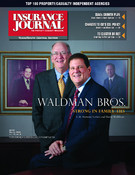Texas House Bill 2155 and Senate Bill 236 were recently debated before each chamber’s respective committee. This critical legislation, sponsored by the Independent Insurance Agents of Texas, merits broad support, as it addresses the inequities insurance agents face in defending consumer claims under Chapter 541 of the Texas Insurance Code.
The proposed legislation would correct an imbalance currently embedded in the law. In 1973, the Texas Legislature enacted the Deceptive Trade Practices Act (DTPA) to address consumer complaints against providers of goods and services, and for the first time, also allowed a private cause of action against insurance agents under the insurance code. The two consumer protection statutes address the same common allegation against insurance agents–misrepresentation of the product or service they sell–but the defenses and remedies available under each vary substantially. Consequently, a consumer can sue an insurance agent under the DTPA and the insurance code for the same conduct and obtain dramatically different results.
The DTPA was amended subsequently to narrow its scope and provide additional defenses. Unfortunately, the insurance code has not been similarly amended. For example, a defendant is entitled to proportionate responsibility for a claim under the DTPA. Proportionate responsibility allows a defendant to assert that the consumer or other third parties are responsible for some or all of the loss, and it gives a judge or jury the opportunity to determine the percentage responsibility of each party. An insurance agent is not entitled to proportionate responsibility for claims brought under Chapter 541 of the insurance code, so an agent found liable under Chapter 541 is responsible for all damages, even if the consumer or third parties bear some responsibility. The DTPA also contains a professional services exemption that exempts suits based solely upon professional malpractice. The insurance code contains no such exemption. Large business transactions (transactions involving total consideration by the consumer of more than $500,000) are also exempt from the DTPA, but not from the insurance code.
The DTPA also has damage limitations not contained in the Texas Insurance Code. The DTPA limits a consumer’s recovery to attorney’s fees, court costs, economic damages and mental anguish damages. The insurance code contains no such limitation, permitting recovery of attorney’s fees, court costs and all actual damages. Further, under the DTPA, a consumer can only recover mental anguish damages if the judge or jury finds the defendant’s conduct was committed knowingly. No such limitation exists in the insurance code. Lastly, under the DTPA, a judge or jury can award up to three times any mental anguish award if the defendant’s conduct was intentional. Under the insurance code, a judge or jury can award up to three times the actual damages if the defendant’s conduct was committed knowingly, a much lower threshold.
There is no justification for depriving insurance agents of the defenses other professionals receive under the DTPA. This inequity has led to substantially higher claims costs for Texas insurance agents and higher insurance costs. Texas insurance agents’ claims costs are nearly twice the national average, even though the claim frequency against them is no greater than in other states. There is likely a direct correlation between the high claims cost and the inability to assert defenses that are available in other jurisdictions. In turn, the number of insurers offering errors and omissions coverage to agents in Texas has declined substantially in recent years, likely as a result of the high cost associated with defending these claims.
HB 2155 and SB 236 simply add defenses and exemptions that are available under the DTPA to Chapter 541 of the Texas Insurance Code. The legislation does not apply to insurance companies or adjusters. The legislation also does nothing to prevent consumers from pursuing legal remedies against insurance agents–it merely gives insurance agents the same defenses that are already available to other professionals.
The legislation will not hurt consumers, but it will prevent insurance agents from being treated unfairly, which is what they currently face on claims brought under Chapter 541 of the Texas Insurance Code. In order to avoid paying the consumer’s attorney’s fees, court costs and 100 percent of the actual damages, an insurance agent must currently win the lawsuit outright, something no other professional is required to do under the DTPA.
This legislation gives insurance agents greater ability to defend themselves against claims under the insurance code. Ultimately, this should lower the cost of insurance and expand the market for E&O coverage in Texas. Considering these desirable outcomes and the inequities of the current system, this legislation is long overdue and should be enacted to put insurance agents on an equal footing with other professionals.
Thomas A. Culpepper is a partner in the Dallas office of Thompson, Coe, Cousins & Irons LLP.
Was this article valuable?
Here are more articles you may enjoy.


 A 10-Year Wait for Autonomous Vehicles to Impact Insurers, Says Fitch
A 10-Year Wait for Autonomous Vehicles to Impact Insurers, Says Fitch  Insurance Broker Stocks Sink as AI App Sparks Disruption Fears
Insurance Broker Stocks Sink as AI App Sparks Disruption Fears  Florida’s Commercial Clearinghouse Bill Stirring Up Concerns for Brokers, Regulators
Florida’s Commercial Clearinghouse Bill Stirring Up Concerns for Brokers, Regulators  How One Fla. Insurance Agent Allegedly Used Another’s License to Swipe Commissions
How One Fla. Insurance Agent Allegedly Used Another’s License to Swipe Commissions 


